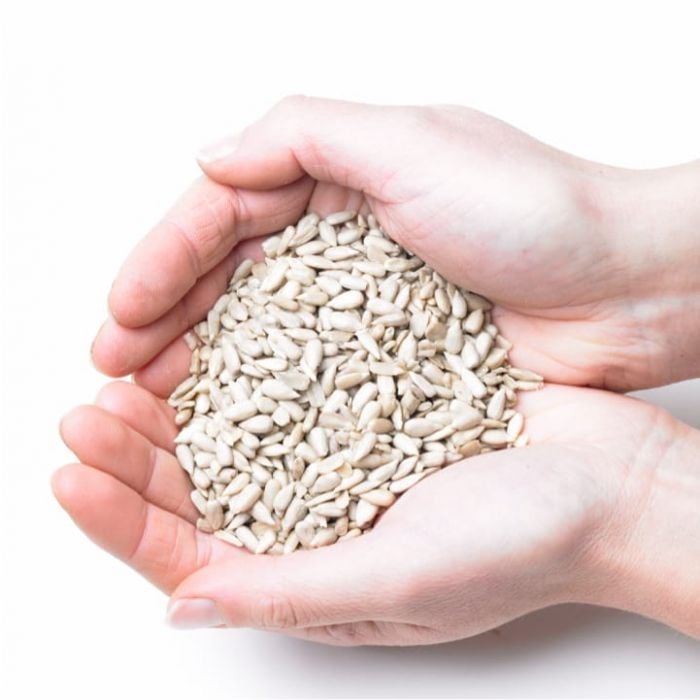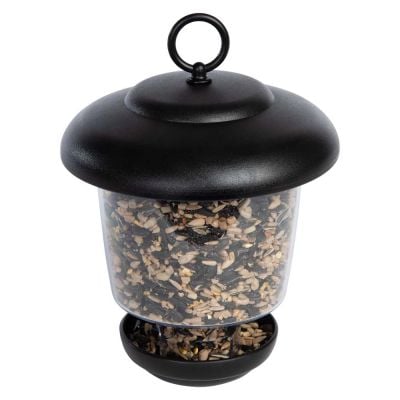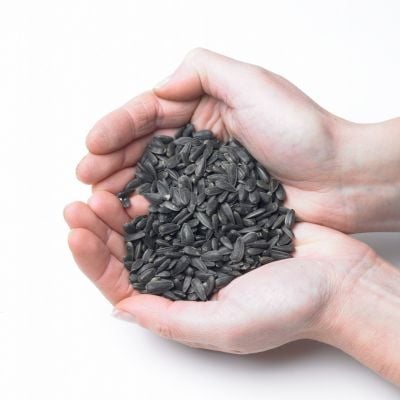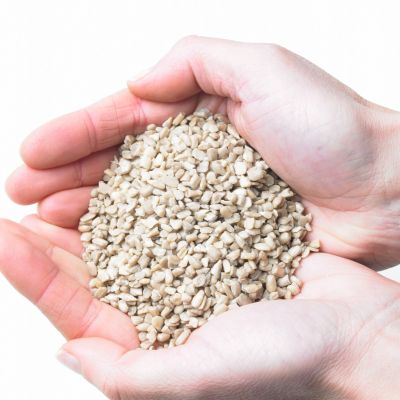Buy sunflower hearts for birds to attract a variety of wild bird species to your garden.
Sunflower seeds come from the flowers of sunflower plants, with the seeds developing as the flower dies off at the end of the summer. They are ideal for garden birds as they help provide them with the energy levels they need.
Although there are many varieties of cultivated sunflower, there are basically just two types that are used for seed for feeding garden birds; striped sunflower and black sunflower seeds (also sometimes called black oil sunflower). Striped has a harder outer husk than black, which is one of the reasons why black is more popular as it’s easier for birds to remove the husk.
Our husk-free sunflower hearts for birds are great for attracting a wide range of wild birds to your garden all year round. With the husk pre-removed, our sunflower hearts for birds can also be enjoyed by softbill birds. This includes birds such as the Blackbird, Song Thrush and Robin (see our 'What birds eat this' section for more information on this).
We also offer Sunflower Heart Chips. These are easier to consume for smaller species such as Dunnocks and Robins. Chips are an ideal type of bird feed for the fledgling season. Sunflower hearts are a nutritious seed and can be found in a number of our mixes. They are a great energy and protein source, which makes sunflower hearts ideal for all seasons and stages of bird life.
With the husk removed, birds can enjoy the whole seed without wasting energy on cracking them open to feed. This is especially important during colder months, when birds need to conserve their energy, and it also means that a wider range of bird species -- including softbill birds like Blackbirds and Robins -- can eat them.
Providing a mix of different feeding methods is central to success if as many species of bird in your garden are to benefit from sunflower hearts:
- Hanging seed feeders
A hanging seed feeder is an essential part of the mix, with this mainly used by finches and tits. Finch species such as goldfinch will sit on a perch to eat the sunflower hearts, whereas tit species such as great tit will fly off with a single heart, find a suitable natural perch like a twig, hold the heart with its feet, then chip away and consume small chunks. Using a hanging feeder with round perches will also allow chaffinches and even ground feeding birds like robins to also get to the food (robins swallow the sunflower hearts whole).
- Ground trays or bird tables
A ground tray or bird table, such as this copper roof bird table, allows species such as blackbird, dunnock and collared dove (none of which will use the hanging feeder – though blackbirds do sometimes try) to easily feed.
- Caged feeders
Larger species of bird such as jackdaw and also unwanted grey squirrels will generally be attracted to the easy meal which sunflower hearts represent. So, whilst you should always have at least some open feeders and ground trays (otherwise species like blackbird will miss out), having at least one caged feeder, such as this Ring Pull Guardian or a Squirrel Buster Feeder or one where the ports close when a heavier bird or squirrel stands on the perch, is always a good idea. Read our guides on deterring squirrels and how to keep Jackdaws off your bird feeders for more information on this topic.
You can also scatter sunflower hearts loose on the ground, but only in a quantity which will be eaten each day and, therefore, won’t be left overnight. Two main reasons being a) so rats aren’t attracted, and b) because sunflower hearts are harmful to hedgehogs.
Are you wondering when to put out sunflower hearts for garden birds? Sunflower hearts provide nutrition to different varieties of wild bird. They are easier to consume than either whole striped or black sunflower seeds. This makes them a popular choice in gardens during the Autumn and Winter months.
Using husk-free hearts rather than seeds means birds do not have to expend as much energy removing the outer layer. During colder months, providing bird food that allows birds to reserve their energy is important.
However, sunflower-based bird feed is popular in gardens all year round. It attracts birds from lots of species.
Sunflower seeds and hearts are both nutrient-rich and calorie-dense. This makes them an ideal bird food for a range of birds. Our premium sunflower hearts are an ideal food for birds in the UK during the Winter. They come with the husk removed, which saves the birds time and energy when eating them. Usually, birds need to break seeds down with their beaks before they can consume them properly. This is not bad for the birds, but it does make them use more energy. When the weather is colder, it is better for birds to preserve their energy wherever they can. Because of this, sunflower hearts are a great form of bird seed.
Our sunflower hearts for birds have had the tough outer shell (husk) removed. When some birds eat whole sunflower seeds, they remove the husk first with their beak. Others leave the seed entirely if it still has a husk, as they are unable to remove it themselves. This depends on the species of bird -- and the type of bill -- it has. If you purchase hearts instead of seeds, it means birds do not need to undergo this process. It also means you stand a higher chance of feeding birds that would usually leave whole seeds.
Hearts have many benefits, including that they help birds to preserve their energy, which is especially important during the Winter. Purchasing sunflower hearts over seeds also means that much less mess is left in your garden. This is perfect for those who would rather not have to clean up waste after a bird feeding session. Cleaning up husks from seeds is also important if you want to continue to safely attract wild birds to your garden. This is because a harmful bacteria can grow on wasted husks if they are not cleaned up, and this can be harmful to birds if they sift through them looking for scraps of hearts.
There are a number of benefits to Sunflower Hearts over Whole Sunflower Seeds. Whilst they are slightly more expensive, you are not wasting money on husks which cannot be eaten, giving you better value overall.
Sunflower Hearts boast the same nutritional benefits as Whole Sunflower Seeds, packed with healthy oils, protein and a high energy content (high in calories). This makes them great for birds in all weathers and stages of life.
With Sunflower hearts being husk-free, not only do birds use less energy to consume but there is much less waste left behind in your garden. This also makes them suitable for softbill birds such as Blackbirds and Robins, unlike Whole Sunflower Seeds.
There are a number of benefits to Sunflower Hearts over Whole Sunflower Seeds. Whilst they are slightly more expensive, you are not wasting money on husks which cannot be eaten, giving you better value overall.
Sunflower Hearts boast the same nutritional benefits as Whole Sunflower Seeds, packed with healthy oils, protein and a high energy content (high in calories). This makes them great for birds in all weathers and stages of life.
With Sunflower hearts being husk-free, not only do birds use less energy to consume but there is very little waste left behind in your garden. This also makes them suitable for soft bill birds such as Blackbirds and Robins, unlike Whole Sunflower Seeds.
The larger the size the better value for money. However, if you haven’t tried feeding sunflower hearts to your garden birds before, then we’d recommend starting with a 6kg bag, then if that works then move to a 13kg sack. At Vine House Farm Our sunflower hearts come in five different pack sizes, with four weights available for sunflower heart chips.
Provided they’re kept dry in a sealed container and in a cool place, then no they won’t go bad. Also, the popularity of sunflower hearts with garden birds means that a supply is quickly used up anyway.
If you want to spot a UK Robin in your garden and are wondering whether Robins eat sunflower hearts, the answer is yes.
Robins mainly feed on insects, including beetles, as well as worms, when they're in the wild. However, they also eat berries, nuts, suet and sunflower hearts. In fact, Robins will feed on pre-husked seeds rather than whole seeds, as the fact they are a soft-bill species means they are unable to crack the tough outer shell (husk) of whole seeds. This makes hearts an ideal addition to your bird feeder/feeding stations if you want to attract Robins and other soft-bill species to your garden.
If you want to spot a variety of wild birds, you must include a variety of types of wild bird feed. This includes: seed mixes (including those which contain black sunflower seed), suet balls, cakes or pellets (especially during the Winter), nuts (especially peanuts) and mealworms.
Great spotted woodpecker are known to eat sunflower seeds, and will often cling precariously onto hanging tube feeders to get to sunflower hearts.
If you are trying to feed these birds in your garden, it is worth bearing in mind their size. Woodpeckers are larger than the majority of songbirds, so place sunflower hearts on a bird table or ground feeder. This will give them easier access.
If you’re asking ‘what birds do sunflower hearts attract’, you can find more detailed information see the ‘which birds eat sunflower hearts’ section below.
Sunflower hearts will potentially attract a large number of bird species to your garden, and notably most species of tit and finch, plus softbill species such as blackbird. A list of the more common species include:





